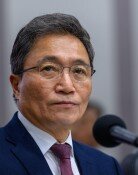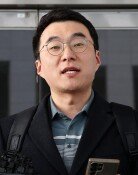Hwang's statement triggers partisan dispute
Hwang's statement triggers partisan dispute
Posted November. 21, 2000 21:17,
The publication of a statement by Hwang Jang-Yop, the former secretary of the North Korean Workers¡¯ Party who defected to the South, alleging that he was banned from contacting politicians and media figures, is sending a wave of repercussions through the political circle.
The opposition Grand National Party (GNP) took the political offensive on Tuesday with its demand for the resignation of Lim Dong-Won, director of the National Intelligence Service (NIS), who played a leading role in promoting inter-Korean relations as a special presidential envoy.
In a meeting of key party post holders, the GNP contended that the government blocked Jang's external contacts, fearing that if he opens his mouth, people in the South will become aware of the actual situation in North Korea and the government's unrealistic North Korean policies, thus hampering inter-Korean measures.
In the afternoon, GNP president Lee Hoi-Chang convened a meeting of the Hwag Jang-Yop case probe committee and defined the government's maneuver as disturbing the national order. Rep. Kim Ki-Bae, GNP secretary general, said after the committee meeting that his party would take issue with the case at the National Assembly, contending that the custody of Hwang constitutes an anti-constitutional and anti-humanitarian crime.
Rep. Kang Chang-Sung, probe committee chairman, disclosed that following the NIS's statement that Hwang refused to comply with the parliamentary request for testimony, he met with Hwang and asked whether he did so. In response, Hwang only nodded, but his eyes were filled with utter discontent, Kang added.
On the other hand, the ruling Millennium Democratic Party maintained that Hwang should be prudent in his activities, noting that he is in a special position, thus taking the government¡¯s side. However, some of its lawmakers appear to be embarrassed over the issue.
Rep. Lim Chae-Jung of the GNP alleged that Hwang behaved as if he was the only authority on North Korean affairs, thus raising problems, therefore, he may well refrain from any acts running counter to the government's North Korean policies as well as its unification formula.







